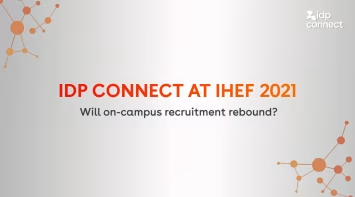Rich in diversity, dynamic economies; combined with youthful populations: there has never been a better time to connect!
The Middle East is by no means a ‘one-size-fits-all’ market. This is a complex and diverse part of the world with contrasting education expenditures, varying degrees of complexity in regulatory landscapes, and where face-to-face relationships carry much weight. Marketing strategies which prove fruitful in one country may require an entirely different approach in another. Incorporating insights from our destination managers across the Middle East, this article provides useful tips and tricks to consider when recruiting in the region, ensuring long-term and sustainable growth in an increasingly competitive market.
Despite the region’s many contrasts, one thing Middle Eastern countries do share in common are youthful populations, with over 70% under the age of 30, which may seem desirable when compared to Europe’s aging populations, but also brings challenges if not properly managed. The ‘youth bulge’ the region is currently experiencing has resulted in the highest youth unemployment globally as countries struggle to absorb young people into the workforce. This is why higher education is not only important in terms of creating an educated and skilled workforce; it also serves to stem the flow of young people entering the workforce and manage unemployment levels.
The region is a blend of self-funded and sponsored students. However, budgetary constraints must also be taken into account. For example, Saudi Arabia has one of the highest education expenditures in the world and the Two Holy Mosques Scholarship Program provides sponsorship for study abroad. Similar sponsorship programs are offered in Kuwait and the UAE. However, these countries are also home to large expat populations who are self-funding and will be looking for more affordable study options. Iran, Turkey, and Egypt are also price-sensitive markets and will be looking to institutions which offer affordability, good return on investment, post-study work opportunities, internships, and scholarships.
Diversification is key. Casting a wide net and implementing a range of tools when planning your recruitment strategy is essential. To effectively engage with future students from this region, where over 90% of people have access to the internet, smart digital marketing campaigns should play an integral role in your recruitment strategy. Two fifths of students from this region cite social media as the main influence on their study abroad choice. We’ve been speaking to our colleagues on the ground in the region to find out what works and what doesn’t and how best to connect with their Gen Z audience.
Ten Tips & Tricks
Be visual and excited about your brand: share photos, student reviews, animated short videos & testimonials which can provide an inside look at your institution; use GIFs and emojis (sensitive to cultural norms), virtual campus tours that highlight facilities alongside student well-being and student safety.
Have an effective digital marketing strategy and strong social media presence: connect through TikTok, Instagram, Facebook and WhatsApp; onboard important influencers in the region and connect with their followers and potential students; use competitions or incentives to engage students and don’t forget parents and mature students by connecting with this audience on LinkedIn.
Get involved and be present at recruitment fairs: face-to-face relationships are highly valued in this part of the world for building trusted partnerships and is often a prerequisite of doing business. Presence at recruitment fairs is one way to get know a country, understand its cultural values, and show key decision makers you care enough to show up.
Demonstrate your institution’s unique selling points: scholarships, great in-country student support, help finding accommodation, peer mentorships, clubs and societies. Bring your academics and give taster sessions on what your institution offers; allow students to put a face to your institution.
Work with Ministries of Education: research how to get on their list of approved institutions—scholarships are often subject to this—find out how by connecting with the local cultural attaché and maintain good relationships with sponsoring bodies (KSA is a 75% sponsored market).
Get personal: offer a one-to-one session—in-person or virtually— where students can connect directly with someone from your institution to discuss your programs.
Know your market: countries like Iran need opportunities for virtual and hybrid engagement e.g., virtual recruitment fairs and use platforms such as Telegram, Instagram, Dideo.ir and WeChat to connect with their audience. Recognize markets which are price sensitive and may need more flexible payment plans.
Target international schools that offer international curriculums: don’t forget the large expat populations living there who will leave secondary school with international qualifications that can align seamlessly but do not have access to sponsorships so may require incentives or discounted fees.
Be flexible on entry requirements: recognize both academic and industry experience as well as in-country qualifications when considering parity; be flexible on English language requirements – offer support to develop language skills.
Remember your best advocates are your students: encourage use of peer-to-peer platforms such as The Ambassador Platform (TAP) where potential students can hear first-hand accounts from peers in their language. Reputation is everything so avoid cancellations; have quick turnaround on applications and respond timely to counselor and student inquiries. Remember this is your first interaction with a student and efficiency and organization creates confidence.
The value of in-person engagement in the region should not be underestimated
Finally, the value of in-person engagement in the region should not be underestimated. It is crucial for sustainable growth, building trusted partnerships and gaining access to markets. Attendance at recruitment fairs offers the chance to meet with key decision makers, learn about the local culture, and show your institution is genuinely interested and cares by being present. Fairs help to raise the profile of institutions among students, where they can find out about ranking, location, safety, subjects, affordability, and scholarships. It is essential to have active engagement in the region. IDP’s Middle East Study Abroad Expo offers a platform where institutions can interact with local partners and potential students. The Expo is a major event run twice a year and sees anywhere from 300 to 1500 prospective students per city in attendance.
IDP Middle East Study Abroad Expo Spring 2024
Jordan: Feb 14-15
United Arab Emirates: Feb 16 -18
Oman: Feb 19
Kuwait: Feb 20
Bahrain: Feb 21
Saudi Arabia: Feb 23-25
Iran: February 27
Lebanon: March 7
Turkey: March 9-10
To find out how your institution can participate in the region’s upcoming student recruitment fairs, reach out to our Senior Events and Marketing officer, Ruby Jamison: ruby.jamison@idp.com, or your Client Success Manager.
You might like...

Changing Parental Perceptions and Motivations in the International Education Decision Making Process
Parents are now more concerned about graduate employment opportunities than distance from friends and family.

Growing Student Markets in Africa to Watch in the Next Decade
Source market population and economic growth are key factors

How High Cost of Living and Global Economic Instabilities are Affecting International Student Perceptions
Supporting and encouraging prospective students to do financial research and their sums.



